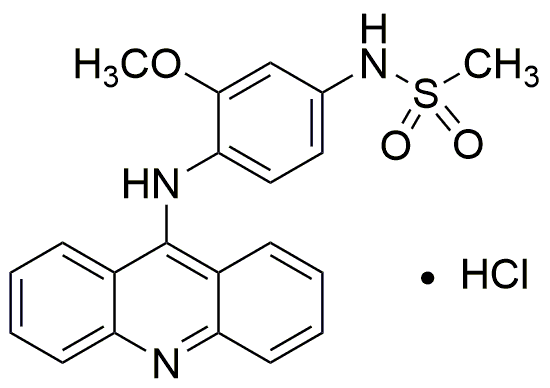Amsacrine hydrochloride is widely utilized in research focused on:
- Cancer Treatment: This compound is primarily used as an antineoplastic agent in chemotherapy, particularly for treating acute leukemia. Its ability to intercalate DNA helps inhibit cancer cell proliferation.
- Pharmaceutical Development: Researchers explore its efficacy in combination therapies, enhancing the effectiveness of other anticancer drugs, which can lead to improved patient outcomes.
- Cellular Mechanism Studies: Amsacrine hydrochloride is valuable in laboratory studies investigating cellular mechanisms of drug resistance, helping scientists understand how cancer cells evade treatment.
- Drug Formulation Research: The compound is used in developing new drug formulations, focusing on improving bioavailability and reducing side effects, which is crucial for patient compliance.
- Biochemical Assays: It serves as a tool in various biochemical assays to study DNA interactions and the effects of DNA damage, providing insights into fundamental biological processes.
Informations générales
Propriétés
Sécurité et réglementation
Applications
Amsacrine hydrochloride is widely utilized in research focused on:
- Cancer Treatment: This compound is primarily used as an antineoplastic agent in chemotherapy, particularly for treating acute leukemia. Its ability to intercalate DNA helps inhibit cancer cell proliferation.
- Pharmaceutical Development: Researchers explore its efficacy in combination therapies, enhancing the effectiveness of other anticancer drugs, which can lead to improved patient outcomes.
- Cellular Mechanism Studies: Amsacrine hydrochloride is valuable in laboratory studies investigating cellular mechanisms of drug resistance, helping scientists understand how cancer cells evade treatment.
- Drug Formulation Research: The compound is used in developing new drug formulations, focusing on improving bioavailability and reducing side effects, which is crucial for patient compliance.
- Biochemical Assays: It serves as a tool in various biochemical assays to study DNA interactions and the effects of DNA damage, providing insights into fundamental biological processes.
Documents
Fiches de données de sécurité (FDS)
La FDS fournit des informations de sécurité complètes sur la manipulation, le stockage et l’élimination du produit.
Spécifications du produit (PS)
Le PS fournit une description complète des propriétés du produit, notamment sa composition chimique, son état physique, sa pureté et les exigences de stockage. Il détaille également les plages de qualité acceptables et les applications prévues du produit.
Certificats d'analyse (COA)
Recherchez des certificats d'analyse (COA) en saisissant le numéro de lot du produit. Les numéros de lot et de lot se trouvent sur l'étiquette d'un produit, après les mots « Lot » ou « Lot de fabrication ».
Numéro de catalogue
Numéro de lot/série
Certificats d'origine (COO)
Ce certificat d'exploitation confirme le pays dans lequel le produit a été fabriqué, et détaille également les matériaux et composants utilisés et s'il est issu de sources naturelles, synthétiques ou autres sources spécifiques. Ce certificat peut être requis pour les douanes, le commerce et la conformité réglementaire.
Numéro de catalogue
Numéro de lot/série
Fiches de données de sécurité (FDS)
La FDS fournit des informations de sécurité complètes sur la manipulation, le stockage et l’élimination du produit.
DownloadSpécifications du produit (PS)
Le PS fournit une description complète des propriétés du produit, notamment sa composition chimique, son état physique, sa pureté et les exigences de stockage. Il détaille également les plages de qualité acceptables et les applications prévues du produit.
DownloadCertificats d'analyse (COA)
Recherchez des certificats d'analyse (COA) en saisissant le numéro de lot du produit. Les numéros de lot et de lot se trouvent sur l'étiquette d'un produit, après les mots « Lot » ou « Lot de fabrication ».
Numéro de catalogue
Numéro de lot/série
Certificats d'origine (COO)
Ce certificat d'exploitation confirme le pays dans lequel le produit a été fabriqué, et détaille également les matériaux et composants utilisés et s'il est issu de sources naturelles, synthétiques ou autres sources spécifiques. Ce certificat peut être requis pour les douanes, le commerce et la conformité réglementaire.


